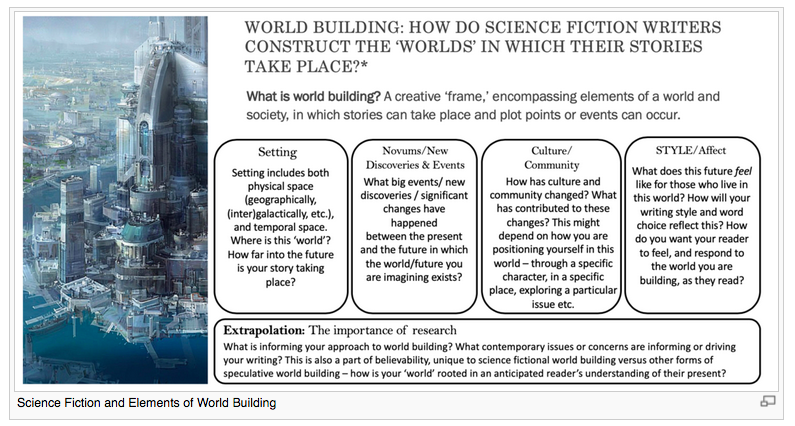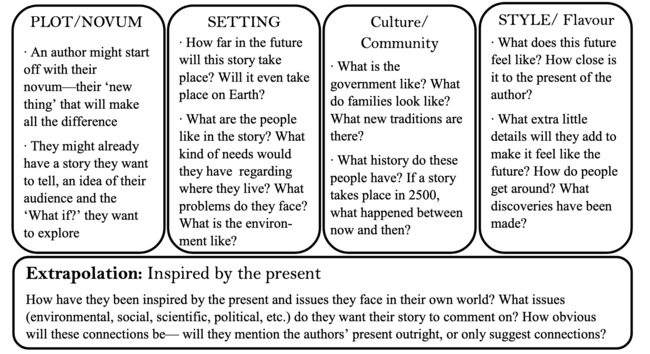Speculative Fictions and Educational Futures: Difference between revisions
Wiki admin (talk | contribs) |
Wiki admin (talk | contribs) |
||
| Line 68: | Line 68: | ||
Any take away points from this course (in relation to technology, new media, education, learning, or your own uses of tools for learning/making outside if schools, in your lives)? | Any take away points from this course (in relation to technology, new media, education, learning, or your own uses of tools for learning/making outside if schools, in your lives)? | ||
Group Authorship though if differently people have different perspectives, please share those differences and take away points. | Group Presentation Authorship -- though if differently people have different perspectives, please share those differences and take away points. | ||
== Groups == | == Groups == | ||
Revision as of 11:13, 30 October 2023
"Futures studies is the systematic study of possible, probable and preferable futures."
Introduction
The last few weeks we have worked with storytelling tools like ComicLife and video production media, coordinated with inquiry. This week we shift to a collaborative storytelling project using MediaWiki (the same basic coding platform as Wikipedia). There are a lots of wikis out there, and your school board tech should be able to set you up (or even install) one of these free systems on the server.
Our collective goal is to create a kind of storytelling ecology and to create, in groups, possible future worlds of education. In thinking about the future of education and learning, we also need to consider transformations in technology, culture, and (bio)physical environments.
These are the major questions at hand:
- As things are now, what might the future of education look like? (If we 'extrapolate' - or say 'what if?')
- Why is the work of looking forward and imagining possibility important for us, both in and beyond school contexts?
- Does considering possible futures help us think critically about the present, past and future?
Collaborative World Building
Using the hand-outs as blueprints: you will (in groups 4) imagine the future of education via speculative storytelling and world building. Your task is to come up with, and agree upon, some central facets of this new world like: year, state of society/politics, role of schooling (or if there are no more formal schooling institutions, how do we learn?), impacts of technology (e.g., extrapolate on social media, virtual reality ['meta'], environmental issues, surveillance, social justice, transhumanism, politics, etc.) and related aspects of human life like identity, social roles, class structures, EDI (equity, diversity, and equality) and so on. You will need to get together and do some brainstorming to piece this world together.
While you extrapolate, consider the educational/learning practices and theories discussed in this course (or other courses) as resources for imagining/extrapolating.
Once you have 'sketched out' a common world together, you will collaboratively write about what this world looks like, and how education/learning fits in, along with the rest. Course ideas/texts/theories might be used to guide your thinking in some way.
Science Fiction and Elements of World Building
Content (95%): Use world building techniques and processes of extrapolation, etc, (covered in class) to imagine the future of education in the form of a wiki page. To begin, you need to identify the larger, overarching problems facing education, schools, and youth today - and then consider a future condition or "state of affairs" in relation to these challenges or current problems - be them social/cultural, ecological, institutional (schools), pedagogical, and or technological. Consider (educational) questions related to equity, access, inclusion, diversity, and social justice.
Consider the conditional term: "What if?" and review the handouts to help.
Each project should include both Wikipedia style entries as well as a first-or third-person narrative accounts of this ‘future’ (through the eyes of someone living in this imagined world). What do you imagine it will feel like to learn in the future? How will it look (if current challenges and problems are not dealt with; if new "innovations" are invented or applied)? For example, will we learn alone, or in community? What will be the role of technology in learning, in relation to pedagogy? How will we learn?
Technical Expectations
Create (as a group) a collaborative future world 'home page' using the Wikimedia encylopedia format/genre of description. Think 1500-2000 words range as a group.
Create Your Individual Pages that link from your home page: Each individual page should be in story form: a first-or third-person account of living in this world that reflects on the educational/learning aspects as well as other facets of the the world (e.g., using a found 'memoir', a 'found' diary, or a news story about someone living in this world). Think 500-1000 words for a story, if you go over a bit, fine, though 1,500 words MAX.
Ensure you address aspects of learning and education: What is the relation between schools/education and the world you have built? What and how do people learn? Where, when do people we learn? How is curriculum understood/used (if there is one)? What tools are utilized? What is the role of the teacher (if there is one)?
Add images sourced from creative commons or the web [put the link at the bottom of the page as a reference].
Use images or the gallery tool somewhere on your future world home page.
While story is important, the goal is to create a coherent world that extrapolates on (or accelerates) current trends and conditions, and imagines future conditions and effects. Each member of the group should read the others' story pages. Each member should offer feedback and suggestions - and make sure that the world is (semi)consistent.
Use the following image from Dr. Brittany Tomin's dissertation work (2021) to help guide your brainstorming process. These are ideational helpers, not expectations. [1]
Reflection on Process and Final Presentation (* 5%)
Tuesday December 6 (Group Presentations)
For the final day of class, I will ask you to prepare, in your groups, a final (brief!) presentation (with group slide deck) that explores ‘take away points’ for the wikimedia project: How was this future of education inspired by your observations in the present? What process did you go through to construct your future narrative? What challenges did you face in imagining the ‘future’ of education? Is this kind of storytelling important? Which course ideas/texts (may have) guided your thinking in some way?
The Big Question: Did thinking critically about the future help you think critically about the present? If so, in what ways?
Any take away points from this course (in relation to technology, new media, education, learning, or your own uses of tools for learning/making outside if schools, in your lives)?
Group Presentation Authorship -- though if differently people have different perspectives, please share those differences and take away points.
Groups
References

